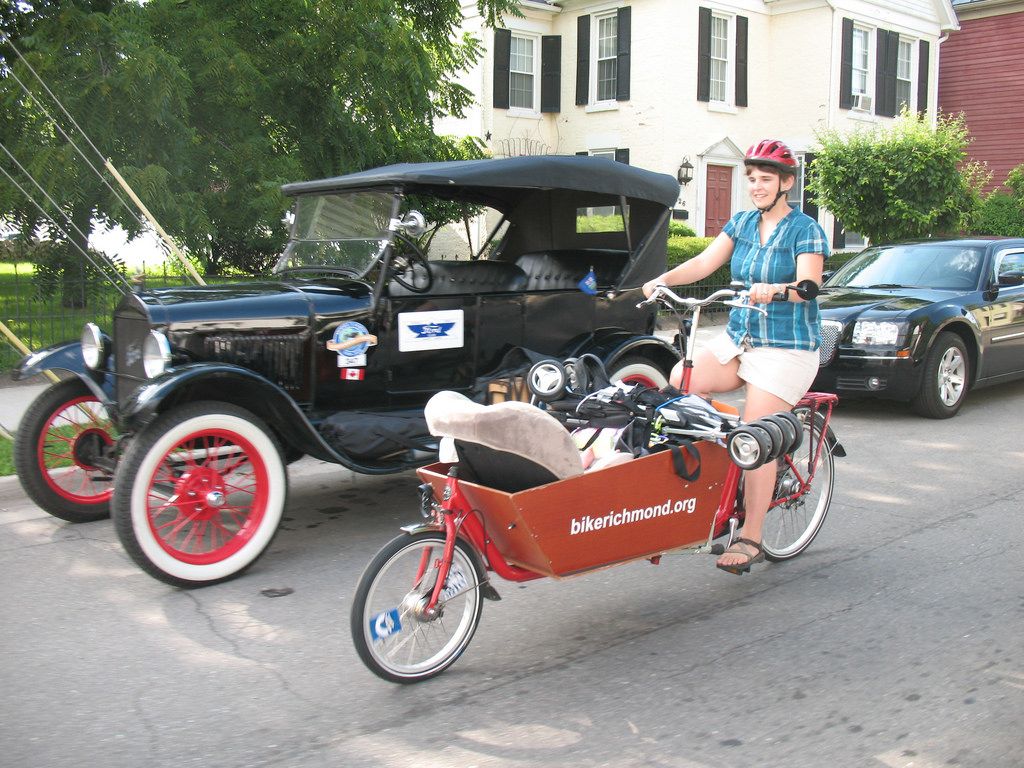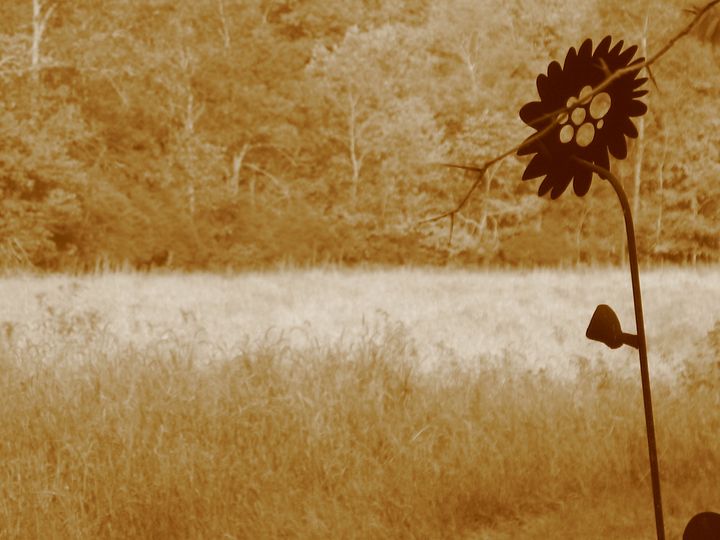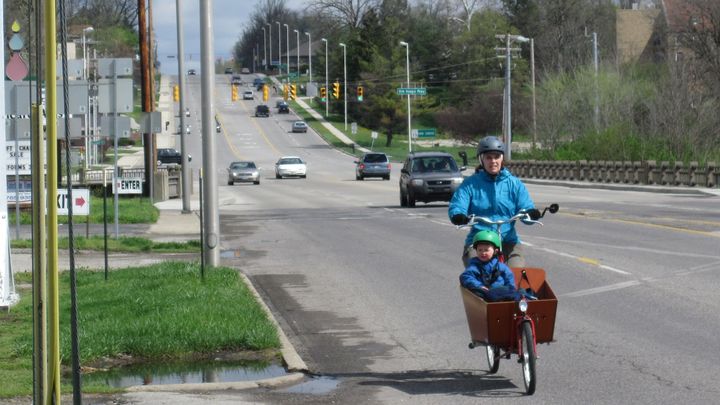Wanting to get rid of my car was easy, committing to it was hard

I found myself driving my car a short distance to work because I had it. The car was easy. I drove it when it was very hot, or very cold, or very rainy, even though I could have walked or bike the same distance.
In an “Aha” moment over cereal one morning, I realized that on those days, I was wearing the car. The primary function on those days was protect me from the weather, not transportation. It was my winter parka, my umbrella and my air-conditioned summer suit.
I felt silly for wearing my car and started to think selling the car, although neglecting it was easier. I dreamed of a more efficient wardrobe for inclement weather, but I had many fears which held me back from living out my values.
How would I visit my family in Kentucky? How would I get to work through the cold winters? What about rainy days? How would I get groceries? Would I be a burden on my friends who have cars? What if I want to just hit the open road, like Thelma and Louise? Would I be able to make it to business meetings? What about my freedom? I had fears.
My fears grasped me firmly by the carburetor. Or was it the alternator? I still didn't know the difference, I just knew I could not let go. So I made an expensive compromise. I played a game by keeping the car parked in my driveway, but tried not to drive it. I liked to think it was a game, anyway. Maybe it was more like justified neglect.

This helped me overcome some of my fears, but it didn't help my car. Eventually, the battery died from sitting there, and the windshield wipers need to be replaced. Later, it developed a brake problem. On two occasions a window was shattered, by thieves too incompetent or careless to actually remove the stereo. My indecisiveness was costing me.
On a memorable crisp fall day in mid-September, 2001, I was ready to break the rule and drive the car. I had a meeting that I wanted to get to in a hurry. But my emergency-use-only car didn't start. Game over.
That moment I can pinpoint: the first time my car failed to start and I got along fine without it. I made it to that meeting another way, and life went on. I can't recall the moment I knew I was comfortable with my decision. It's like trying to recall the moment relaxation begins. Sometimes there is an instant release, (or in my case, a spasm), but more often then is only an awakening, with the realization that I've drifted to somewhere pleasant and have been there a while.
My own awakening was later, looking back to see a surprising transformation had happened. My greatest fear, the fear of losing my freedom, was unfounded. Getting around under my own power provided a sense of freedom and control far greater than driving my car ever did. I feel alive and connected. When the weather changed, I noticed and I responded.
Each foot step or pedal stroke was my own power transforming time and space. Now when my much simpler vehicle breaks, I have the satisfaction of understanding how it works and how to fix it myself. Maybe the Amish are on to something.
But more than anything, going car-free has been an opening to understanding that this was only the beginning of difficult but worthwhile fears to face. For me, my transportation choice was an expression of my values. I know others may hold similar core values and come to different conclusions about their lifestyle.
My story is one of the past. In retrospect identifying a better decision is always much easier. I have the outcome to justify the decision.
Decisions in the moment can be much harder. At the moment I'm not weighing the whether to unplug a parent from life support or whether to give a friend a hug as she turns to go. I understand that decisions are not often between good and bad, they are are between and bad and worse. And it's not clear which one is worse.
But we can ask ourselves questions of discernment. Am I acting out of fear? Which action is in line with my values? While some decisions will remain difficult, others will gain clarity.
If you ask me, I will admit that bringing my own cloth bags is inconvenient, although in line with my values, so I should do it. If no one asks, and I don't ask myself, I may conveniently forget them.
Individually it's easy to hold on to our fears, as I did, even when it became expensive for me to do.
When my first child arrived, my fears of the necessity of a motor vehicle returned, along with a whole new set of values questions like "cloth versus disposable", and "two working parents versus one". The fear of being an adequate provider. With some faith, some difficult decisions can work themselves out in time.
Like my car story, I make important decisions in the rest of my life slowly. But once I've made them, I understand why I've made them. Most of the time, anyway.
While writing this, I realized I had an ongoing fear so trivial that I had to laugh at myself for continuing to hold on it. For months I had been putting off asking my neighbor at work if I could park my cargo bike under their awning when it rains, so it would be off the sidewalk and out of the rain. I really had nothing to lose, but I suppose I feared rejection or conflict, so I always stalled.
Every other time I'd stopped there to lock my bike, the thought of asking crossed my mind, and then left as I went inside. But I did not stop in those moments to ask myself why I was choosing one path or avoid another. It is in these moments of not asking discerning questions of ourselves and not asking of them each other, that questions of fear and values go unanswered.
Now if I can still hold onto a small fear while writing a post on the topic, I can only imagine the difficulty in tackling a fear that truly tests faith: Quitting a job to pursue a calling, ending a bad relationship, overcoming addiction to social networking websites, or getting rid of a car.
We have the power to take small steps to align with our values. Carpool one day a week. No TV on Wednesdays. One less toxic social networking site.
My step was own a car, but to try not to drive it. Keeping the car during this time cost me thousands to recover from break-ins, insurance payments and repairs of negligence. But this in-between state, this failure, was essential to the end result. It was not option to success.
I see self-discipline as a gift to my future self, doing something I might not want to do today in support of a larger goal I have tomorrow. Like doing push ups every morning so that eventually I will increased my upper body strength to the level of average ability. Somehow having a child interrupted my discipline of push-ups, but for those who possess this gift in a greater dose I encourage you consider a gift of self-discipline to your future self.
We also have the opportunity to embrace failure. I like the stance of Kentucky poet Ron Whitehead who wrote “I will fail like no others dare fail.”. We can fail to own a car. Fail to identify an alternator. Fail to petition our leaders, and petition them again anyway.
When we are willing to face our fears, to fail, to be disciplined, we have the power to transform ourselves and communities through small steps, reaching big goals.
Postscript: after becoming car-free when I was single, a car re-joined my household through marriage and as time passed and the stork delivered, we became a car-lite family of four.
An earlier version of this was published in September, 2006.



Comments ()